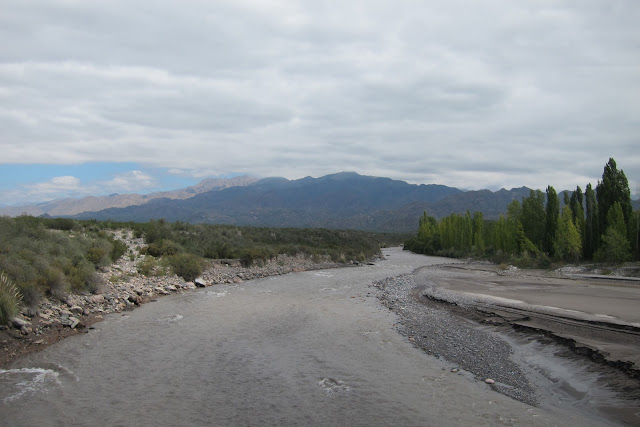After a very relaxing three-day break, the group was ready to pick up where they left off in the history and culture class with Marcelo Reynoso. This six-day section focused on the era of Perón in Argentine politics and was divided into two parts. The first part included lecture time for half of the day while the other half of the day was focused on local fieldtrips. We took three fieldtrips during these first few days. The first fieldtrip included a visit to the local artisan’s market. While there we learned about the history of how the market came to be and how it continues to progress today. Our second trip took us to El Museo de Cuyo, which focused on the history of the Mendoza region, where we learned about several important figures such as San Martín, la familia de Francisco Civit, and Manuel Belgrano. The last fieldtrip focused on the economical development of IMPSA, a large industrial factory in Mendoza. There we learned about an Italian family who transformed their small workshop into one of the largest international industrial factories in Mendoza. After our visit to the industrial factory, Leonardo Román, a history student from the University of Cuyo, visited us and aided in the discussion about Peronism during the 1970’s.
 |
| Touring wind turbine manufacturing at the IMPSA plant |
On Saturday we got up bright and early to start the second half of our six-day history and culture lesson, a three-day trip to Valle de Uco. After a short stop at a monument dedicated to San Martín we arrived in San Carlos where we sat down for a talk with Camilo and Blanca. The couple shared their history of how their family arrived in San Carlos and also talked about their experiences during the presidency of Perón. After visiting with Camilo and Blanca, we set off to meet with Marcelo’s parents to talk about their life in San Carlos. It was interesting to see the two varying viewpoints of the couples on politics during the era of Perón and the differences in the history of their families.
The next morning we embarked on a bike excursion. This adventure led us on a tour of the canal system of San Carlos. We had several stops where we looked at how the canal system was controlled and listened to Marcelo explain the importance of the canals. After a 13 kilometer ride the group sat down for a quick lunch before a rafting trip on Río Tunuyán.
Following a chilly ride down river, the group returned on bike to the hostel in order to get ready for that night’s festivities. For dinner we headed to a local restaurant called Bar del Abuelos in San Carlos that continues traditional culture. This restaurant still uses family recipes that are 60 years old and also maintains traditional dress. While enjoying the food, we were also serenaded throughout the night.
 |
| Rio Tunuyan and the Frontal Cordillera, Valle de Uco |
| TIES crew ready to raft the Rio Tunuyan |
Following a chilly ride down river, the group returned on bike to the hostel in order to get ready for that night’s festivities. For dinner we headed to a local restaurant called Bar del Abuelos in San Carlos that continues traditional culture. This restaurant still uses family recipes that are 60 years old and also maintains traditional dress. While enjoying the food, we were also serenaded throughout the night.
Monday morning included a trip to two government offices in San Carlos that are in charge of controlling irrigation of the region. After talking with the superintendents of irrigation in this region, we were able to fully understand how the irrigation system around San Carlos functions and the different demands that it fulfills. We then returned to the hostel to sit down and talk with two Peronists, people who were in support of Perón during and since his presidency. These gentlemen took time to explain to us their political affiliation and experiences during Perón’s presidency and discuss how they continue to practice this identity. This meeting, as well as the others, helped to put into context the lecture Marcelo had given during the first three days of this section. After a full six days we returned to Mendoza for a short break before starting our biology block.
 |
| Group discussion with Peronistas |
 |
| Our history and culture instructor, Marcelo Reynoso with his parents in Valle de Uco |

No comments:
Post a Comment